|
|
|
Sort Order |
|
|
|
Items / Page
|
|
|
|
|
|
|
| Srl | Item |
| 1 |
ID:
143296
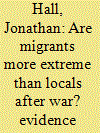

|
|
|
|
|
| Summary/Abstract |
Little is known about the attitudes of migrant populations originating from countries affected by conflict. This article examines a key assumption in the literature: that migrants harbor more conflictive attitudes than locals after war. Until now, we simply lacked the micro-level data necessary to examine migrant attitudes directly. Rather than relying on indirect evidence, I analyze new data from simultaneous surveys conducted in Sweden and Bosnia in 2010. As a whole, the empirical analysis supports the article’s novel theoretical approach. Under certain conditions, migration may promote inclusive and reconciliatory attitudes by improving access to coping resources and providing an exit from detrimental wartime and postwar conditions in origins countries.
|
|
|
|
|
|
|
|
|
|
|
|
|
|
|
|
| 2 |
ID:
143299
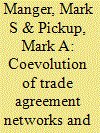

|
|
|
|
|
| Summary/Abstract |
The proliferation of preferential trade agreements (PTAs) and the wave of democratization are among the most significant developments in international relations during the past three decades. The correlation between these is well noted. The causal link between these phenomena, however, remains unclear. On one hand, democracies have been found to be more likely to join PTAs. On the other hand, trade agreements should foster democratization because they undermine the ability of governments to distribute rents to maintain an autocratic regime. If PTAs and democracy coevolve through a selection and a contagion effect, then conventional statistical techniques can produce wholly misleading results. This article presents a new approach based on recent advancements in longitudinal network analysis. Our findings confirm that historically, democratization indeed made states more likely to sign PTAs, but that trade agreements also encourage the democratization of a country, in particular if the PTA partners are themselves democracies.
|
|
|
|
|
|
|
|
|
|
|
|
|
|
|
|
| 3 |
ID:
143295
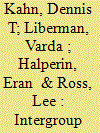

|
|
|
|
|
| Summary/Abstract |
Two studies examined the association of particular sentiments and political identities with Jewish-Israeli students’ responses to a generic plan to end the Israeli–Palestinian conflict and to narrower proposals for cooperative undertakings. Three composites—hatred/anger, compassion/empathy (reverse-coded), and guilt/shame (reverse-coded), and also a global composite combining these three sets of sentiments, were generally associated with negative responses to those plans and negative attributions about the wisdom and patriotism of supporters of those plans. Most of the associations between the global sentiments composite and the relevant responses continued to be statistically significant even after controlling for participants’ political identity. The interaction between the relevant sentiments and the putative authorship of one of the proposals was also investigated. Issues of generalizability, replicability, robustness, and of the relevance of mediational analysis, as well as implications for conflict resolution and potential directions for future research are addressed in a concluding discussion.
|
|
|
|
|
|
|
|
|
|
|
|
|
|
|
|
| 4 |
ID:
143298
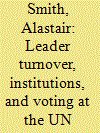

|
|
|
|
|
| Summary/Abstract |
Using evidence from voting in the UN General Assembly (UNGA), this article shows that leader turnover, especially in small coalition, nondemocratic systems, increases the likelihood of policy realignment. Autocrats who are beholden to only a small proportion of the population represent the foreign policy interests of their small number of supporters. When leader turnover occurs, the interests represented often shift too and this results in an increased volatility and regression toward a neutral position of a nation’s alignment at the United Nations vis-à-vis the United States. While such realignments can offer an opportunity to reduce enmity between states, they can also signal growing differences between friends. The impact of leaders change in large coalitions produces more moderate shifts in alignments.
|
|
|
|
|
|
|
|
|
|
|
|
|
|
|
|
| 5 |
ID:
143297
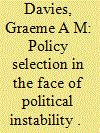

|
|
|
|
|
| Summary/Abstract |
This article bridges the divide between comparative politics and international relations by examining the interaction between domestic instability and policy choices made at the domestic and international level. It is theorized that leaders select from a basket of options that include diversion, repression, and political concessions. It is argued that governmental institutions affect political leaders choices, with more domestically constrained democratic governments eschewing the use of repression, instead opting for diversion and concessions. Whereas autocratic governments will use repression as it is the most effective and least costly option. Using a panel vector autoregression model, the study tests whether political leaders use one or a mixture of responses when confronted with widespread dissatisfaction. The analysis models feedback loops enabling it to simultaneously evaluate the effectiveness of those strategies at reducing instability within the different institutional contexts. The study found little evidence of diversion, but it did find that the international environment affects both policy choices and affected the level of instability in the state. The use of concessions for all states is generally counterproductive when that state is involved in a strategic rivalry whereas they tend to reduce instability when both democracies and autocracies are in a more peaceful international environment.
|
|
|
|
|
|
|
|
|
|
|
|
|
|
|
|
| 6 |
ID:
143293
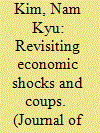

|
|
|
|
|
| Summary/Abstract |
This article revisits the oft-cited relationship between economic shocks and coups. According to conventional wisdom, economic recessions trigger coups. However, existing empirical studies have not consistently produced supporting evidence for that relationship. This article claims that this is partly because existing studies have not differentiated transitory from permanent shocks to the economy. Two different economic shocks could have different effects on coups. Moreover, existing studies have not sufficiently addressed measurement error in gross domestic product (GDP) data. To overcome these problems, I use exogenous rainfall and temperature variation to instrument for economic growth. Instrumental estimates demonstrate, consistently across four different GDP per capita growth measures, that a decrease in GDP per capita growth rates, induced by short-run weather shocks, significantly increases the probability of a coup attempt. Conversely, noninstrumental variable estimates vary according to different GDP measures, and are close to zero, consistent with previous findings.
|
|
|
|
|
|
|
|
|
|
|
|
|
|
|
|
| 7 |
ID:
143294
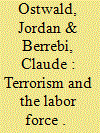

|
|
|
|
|
| Summary/Abstract |
Recent studies have identified correlational associations linking terrorism and females’ standing in the labor market. Theories have been proposed to explain these associations. Some concluded that women’s participation in the labor force could be the driver that moves terrorism; others proposed that terrorism motivates the deviations in the labor force. No study has adequately explored causality and the direction of this association. Using a panel data set of 165 countries and terrorism data from 1980 to 2007, we find that terrorist attacks decrease female labor force participation and increase the gender gap between male and female labor force participation. By exploiting variation across countries and time, we are able to identify and quantify these effects; we are also able to address endogeneity concerns by using two novel instrumental variable approaches. The results are statistically significant and robust across a multitude of model specifications.
|
|
|
|
|
|
|
|
|
|
|
|
|
|
|
|
|
|
|
|
|